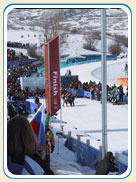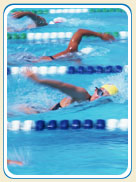Athletes Speak Out
Many athletes are increasingly concerned about the use of performance-enhancing drugs in sport, and are speaking out against it. Here is a sampling of what they are saying…
Cross-country Skiing
Beckie Scott on Canada’s anti-doping movement:

“Canada is largely regarded as a leader in the anti-doping movement, yet we still have the occasional athlete testing positive for banned substances, which shows there are cracks in the system somewhere. Education on doping in sport and playing fair needs to begin at the earliest stages in an athlete’s career, and this is something Canada could be doing better.” (Online at Culture.ca, October, 2005.)
Football
Steve Courson on the use of steroids and other performance-enhancing drugs in professional football:

“It’s not complicated, either you behave like a stand-up person or you don’t. Finally, I guess it gets down to whether or not we want to be remembered historically for being stooges to the myth or for being freed by the truth.” (From a letter recently made public posthumously, Baltimore Sun, July 3, 2008.)
“In the old days when we played, the drugs were legal and penalties for use were non-existent. The more size and strength played a role in your job the more pressure there was to use, plain and simple.” (From a letter recently made public posthumously, Baltimore Sun, July 3, 2008.)
“This continued clandestine use is due to the fact that the rewards are greater and the performance demands are the same.” (From a letter recently made public posthumously, Baltimore Sun, July 3, 2008.)
Dan Hampton on past steroid use in the National Football League (NFL) and the future of sport:
“Through about our Super Bowl (1986), a lot of teams not only condoned it, they almost encouraged it. Then after our Super Bowl, people started taking a new stance. The league began implementing drug-testing policies. But I had to play against all these guys who were using steroids year after year after year.” (“Around Town” by Fred Mitchell, Chicago Tribune, July 16, 2008.)
“Now we have to go back to ‘roots’ athletics, where kids can realize that somewhere down the road, the payoff is not going to come. They have to stay clean, and they’ve got to play clean.” (“Around Town” by Fred Mitchell, Chicago Tribune, July 16, 2008.)
Anthony Munoz on steroid use and other doping in the National Football League (NFL):
“It’s a problem in society, and football being a microcosm of society, you have to say there is some usage. When you have a problem in society, it infiltrates into different businesses. I can’t intellectually say there is a certain percentage [of players using]. But when you see individuals out of uniform, there are definite characteristics.” (“Around Town” by Fred Mitchell, Chicago Tribune, July 16, 2008.)
“It adds to the risk. Not only the internal injuries, but the ability to return from injury. Those are the things I saw. God gives you a natural healing effect, pretty quickly most of the time. But when you see things lingering, then you kind of wonder. It’s a physical sport, and your body takes enough pounding and beating … [steroid use] really multiplies the risk.” (“Around Town” by Fred Mitchell, Chicago Tribune July 16, 2008.)
“A lot of times (fans) get into a comfort zone and say, ‘That’s entertainment.’ Hopefully (that attitude) changes and people look at athletes as humans. I retired at 35 and I have a lot of life to live. To shorten your life by putting chemicals in your body … that’s the thing we need to look at.” (“Around Town” by Fred Mitchell, Chicago Tribune, July 16, 2008.)
Golf
Gary Player on performance-enhancing drugs in professional golf:

“Whether it’s hGH, whether it’s creatine, whether it’s steroids, I know for a fact that some golfers are doing it.” (July 18, 2007, New York Times, July 19, 2007.)
Tiger Woods on introducing testing for performance-enhancing drugs in professional golf:
“I don’t know when we could get that implemented. Tomorrow would be fine with me. I think we should be proactive instead of reactive. I just think we should be ahead of it and keep our sport as pure as can be.” (August 25, 2006, Associated Press, August 26, 2006.)
“There’s always a possibility (some golfers may be using performance-enhancing drugs). Unless you’re tested, there’s always going to be a shadow of a doubt in any sport.” (Week of December 9, 2005, JS Online: Sports: Golf Plus.)
Swimming
Janet Evans on doping in sport:

“The subject matter of doping in sport is a serious field of study. Doping and anti-doping efforts affect hundred of thousands, if not millions, of athletes and extend to all countries and all sports.” (In a letter responding to a column in Swimming World Magazine, Lane 9 News, May 16, 2007.)
Gary Hall Jr. on doping in swimming:
“I’m telling you this: I train with an international group of swimmers and all of them have stories (about performance-enhancing drugs) and a few of them have had offers.” (New York Times, June 29, 2008.)
“I abhor doping. It drives me crazy. I just don’t know how to fight it. What bothers me most is the resignation of a lot of the public that it’s part of sport today.” (New York Times, June 29, 2008.)
Ian Thorpe on doping in elite swimming:
“It would be naïve to think that everyone’s going to be clean at the Olympic Games. Of course, I’ve swum against doped athletes.” (ChinaDaily.com, July 30, 2004.)
“There are thousands of swimmers here (in Barcelona in 2003) and to think that all swimmers are clean is just naïve.” (ChinaDaily.com, July 30, 2004.)
Track and Field
Donovan Bailey on doping in track and field:
“I am someone that doesn’t believe in it (doping) and at the end of the day, it takes away a lot of accomplishments from clean athletes. So, for me, it’s very simple. If you make the decision that you are going to dabble with drugs, then you’re just bad. Find something else to do.” (March 14, 2008, Yahoo News, March 15, 2008.)
Carl Lewis on doping in track and field:
“If people want a clean sport, we must bring together governments, the public and athletes. I would change the law. If you test positive, why can’t it be illegal? We have to get people under oath and get the truth, instead of all the people who lie. The problem is that people choose to cheat.” (BBC Sport, May 6, 2008.)
“We are at a crisis point and instead of sitting around, saying, ‘Oh, my God, I hope no one tests positive,’ I’m going out there and saying, ‘None of my people will.’ I stand for accountability. If I see something funny going on, I’m going to tell.” (November 24, 2007, Telegrah.co.uk, November 25, 2007.)
Edwin Moses on doping in sport:
“With only 15 months to go before the Olympic torch comes to rest in Beijing, it’s time for me and all other clean world-class athletes from every sport to speak loudly against the false claim that doping is simply ‘the way it is’ and the only way to the top.” (June 11, 2007, letter to the Los Angeles Times.)
“Over the last two years I have watched in disgust as more and more ‘name brand’ athletes have become ensnared in the omnipresent net that we have come to know as ‘testing positive’ for performance-enhancing drugs. Whether each athlete implicated is guilty or not, the names form an embarrassing Who’s Who in the world of sport.” (May 21, 2007, writing in the TimesOnline.)
“Counsel to all would-be champions: in training, there are no short cuts. Anyone who tells you differently is selling pure compromise.” (May 21, 2007, writing in the TimesOnline.)
Paula Radcliffe on the need for clean competition in distance running and sport:
“Running is about who works hardest and then runs fastest. It is about getting to the finish first fairly. Every athlete must start from the same point, something that is not possible when some are doping. If you invest so much of yourself, you have a right to fair competition and a right to be able to prove your innocence.” (PaulaRadcliffe.com, as of June 15, 2008.)
“(Doping in sport) not only cheats other athletes, but also promoters, sponsors and the general public.” (PaulaRadcliffe.com, as of June 15, 2008.)

